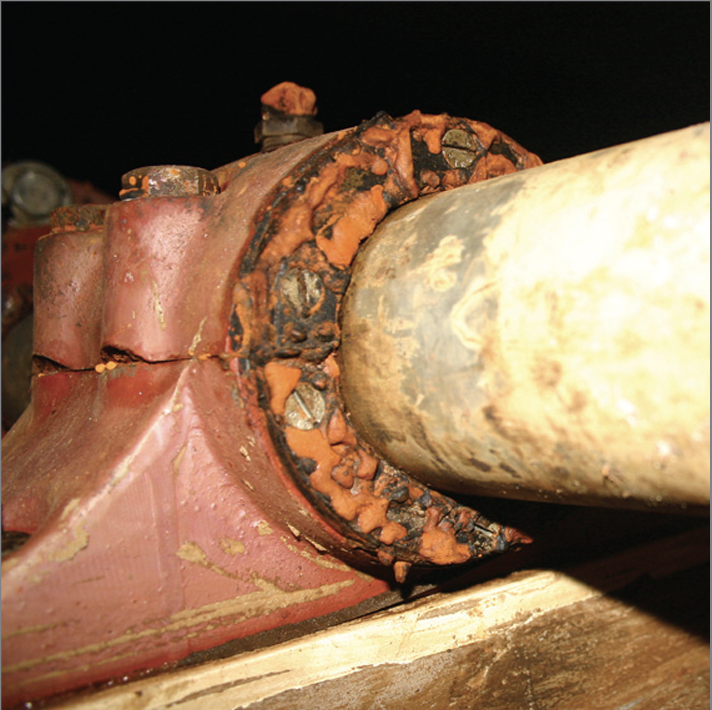Racine Water Treatment Plant
THE SITUATION
Squeaks and groans used to ring through the halls of the Racine Water Treatment Plant, indicating severe bearing wear and warning of impending shaft breakage. Repairing broken shafts and maintaining greaselubricated bearings at the plant required a lot of effort. The affected basin would be shut down for four to six weeks, with three people working to fix the shafts and grease the bearings. The cost to the plant was 960 man/hours (24 man/weeks) per year. Even worse, the shafts would often break soon after being fixed. Clearly, the old bearings had irregular wear and had developed large gaps (see below right), causing shaft instability and eventual breakage.
Replacing the bearings was very expensive and would not permanently solve the problem, but postponing replacement resulted in additional costs. Broken shafts slowed water movement and caused several feet of sediment to accumulate on the basin floors, which necessitated removal and increased maintenance costs. The impaired shafts also compromised creating the energy needed for optimal mixing and floc formation, and made achieving water treatment goals challenging.
BEFORE TREATMENT
Severe bearing wear and warning of impending shaft breakage
THE SOLUTION
Looking for a solution that wouldn’t adversely impact his customers or his budget, Rick King, Racine’s Plant Maintenance Supervisor, happened to hear of Amwell’s Greaseless Flocculator Bearing System. Evaluating the system, Rick quickly saw the possible benefits of a composite bearing/shaft/seal assembly, and contracted with Amwell for the new equipment.
From the start, Amwell‘s full service approach saved Rick outside contractor fees and resulted in a collaboration addressing the plant’s needs for the least amount of cost. Amwell designed the flocculation system to reuse the plant’s existing dry well drive system, while upgrading the shafts to lighter weight material, which finally solved bearing wear, shaft breakage, and related maintenance issues.
The Racine facility’s halls are now quiet. Rick commented that if the Amwell Greaseless Flocculator Bearing System continued to perform as it has since 2005. “We likely won’t have to replace this equipment for another 20 years,” adding that the new equipment has virtually eliminated any shaft or bearing breakdown. The equipment is now reliable and capable of functioning under high stress and increased plant loads. Rick and his staff have not seen any shaft or bearing wear to date, and have been very satisfied with the experience of working with Amwell.
“We likely won’t have to replace this equipment for another 20 years.”
AFTER TREATMENT
Amwell’s Greaseless Flocculator Bearing System. Designed to reuse the plant’s existing dry well drive system, while upgrading the shafts to lighter weight material, which finally solved bearing wear, shaft breakage, and related maintenance issues.
RESULTS
Equipment
Frequent flocculator break down due to bearing failure
- No flocculator shaft breakdown
- Not one failed bearing of the 40 installed
- Recouped cost of equipment in just 3 years
Man Hours
Needed 3 people for 4 weeks to make repairs to shafts twice a year = 960 man hours per year just for repairs
- Racine has saved 960 man hours every year for the last 5 years
- Plant does more work without addtl. hiring
- Routine maintenance now takes just 1 hour twice a year
Staff
Breakdowns increased workload on staff, increasing operating costs by increasing overtime charges
- Balanced work shifts without overtime
- Personnel put on revenue generating activities instead of revenue-eating (repair) activities
Maintenance
- Poorly functioning flocculators resulted in increased sludge build up and increased sludge removal costs
- Old bearings constantly needed grease
- Broken shafts increased cost of maintenance
- Eliminating the need for grease lubrication
- Optimizing chemical mixing and subsequent floc formation, decreasing sludge build up and reducing removal need
- Eliminating the need to repair broken shafts
Maintenance
Basins shut down for 3–4 weeks twice a year for repairs
Equipment runs 24/7/365 with no maintenance needed


